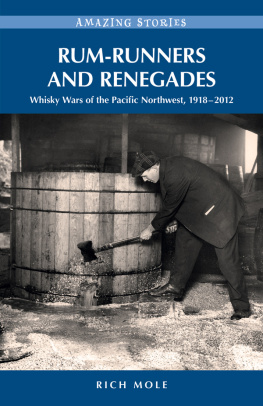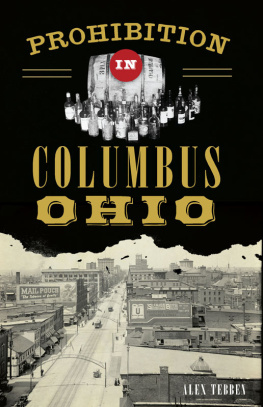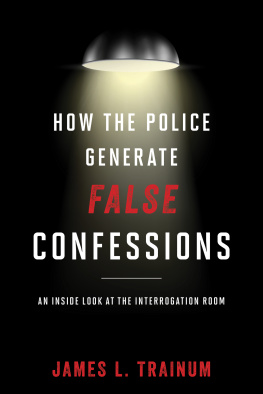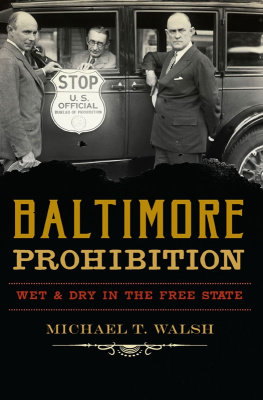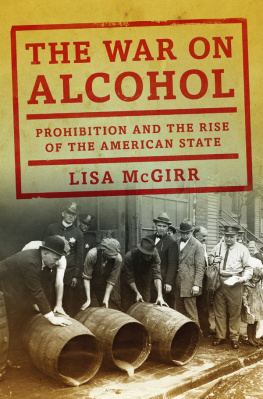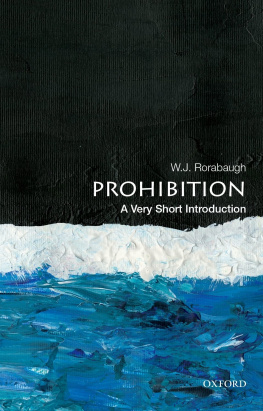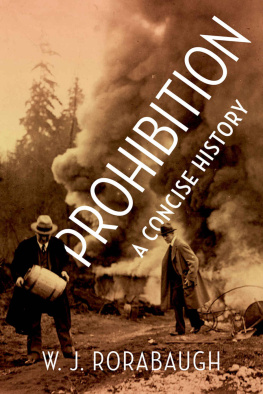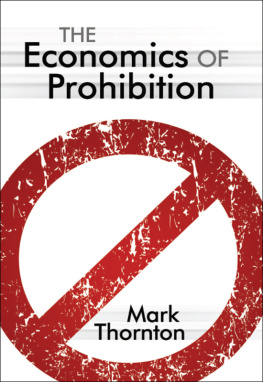THE PROHIBITION ERA AND POLICING
THE PROHIBITION ERA AND POLICING
A LEGACY OF MISREGULATION
WESLEY M. OLIVER
VANDERBILT UNIVERSITY PRESS
NASHVILLE
2018 by Vanderbilt University Press
Nashville, Tennessee 37235
All rights reserved
First printing 2018
This book is printed on acid-free paper.
Manufactured in the United States of America
Library of Congress Cataloging-in-Publication Data on file
LC control number 2017006646 (print) | 2017008298 (ebook)
LC classification number KF5399 .O45 2017
Dewey classification number 344.7305/209042dc23
LC record available at lccn.loc.gov/2017006646
ISBN 978-0-8265-2187-3 (hardcover)
ISBN 978-0-8265-2188-0 (paperback)
ISBN 978-0-8265-2189-7 (ebook)
TO WELFORD MACON DURRER, MY GRANDFATHER
CONTENTS
ACKNOWLEDGMENTS
This book is the culmination of well over a decade of research and thinking about questions of criminal procedure. I began practicing law in Nashville two decades ago and soon discovered that I was better suited for ruminating about the law than I was for the practice of it.
Shortly after I moved to Nashville, I had the good fortune of meeting Don Hall, a professor at Vanderbilt Law School, who gave me the standard advice offered to any aspiring academicpublish. Unlike others, though, he followed up and asked if I had given any thought to possible ideas for law review articles. Somewhere between my seventh and eighth idea, I could tell he had decided he would be my mentor. I am certain I would not be a law professor today had it not been for that meeting. Almost two decades later, and years after Dons premature passing, the Vanderbilt University Press expressed an interest in publishing this book. No one at the press at that point knew the role my time in practice in Nashville or the mentorship I received at Vanderbilt Law School had played in my career, or in this work in particular. Some of lifes apparent coincidences seem, if not providential, at least poetic.
Very early versions of the ideas in this book began to take shape as I tried to learn what it meant to be a criminal defense lawyer and how my skill sets best fit within that job. Excellent attorneysBo Edwards, Jim Simmons, Lionel Barrett, Rich McGee, Bill Massey, Lorna McCluskey, John Oliva, Glenn Funk, and Keith Stewart among themwere part of the very nurturing community of the criminal defense bar in Tennessee that helped me learn the craft that Ive spent most of my professional life commenting on.
I discovered I was better at winning suppression motions than jury trials and began to wonder whya query that led to this book. Perhaps my lawyering skills were better suited to the picayune doctrines of the Fourth Amendment than they were to convincing jurors of a particular version of the facts, but I concluded something very different. I came to believe that my track record revealed something about the criminal justice system. The system seemed to me more willing to give a defendant who seemed guilty a pass if the police illegally seized evidence against him than it did when there was some possibility of innocence.
Studying this irony took me back to graduate school and a fellowship, where I had the privilege of gaining the insights of scholars of criminal procedure, criminal law, constitutional law, and legal history, including Bruce Ackerman, Alan Dershowitz, Bob Gordon, Ken Mack, Carol Steiker, Kate Stith, and Bill Stuntz, each of whom broadened the way I was thinking about our method of regulating police.
Earlier versions of portions of this book that considered the time period from the mid-nineteenth century through Prohibition were published as articles in the Hamline Law Review, NYU Journal of Law and Liberty, Rutgers Law Review, Tennessee Law Review, and Tulane Law Review. Years after I began studying the history of police, I realized that the history I had examined had implications for the way we presently regulate, or misregulate, police. Articles in the Journal of Criminal Law and Criminology, Missouri Law Review, and DePaul Law Review previewed these ideas, which I more fully flesh out here.
Historical research requires librarians with intelligence and tenacity. This story could not have been told without the discoveries made by Naomi Ronen at Harvard Law School, Ed Sonnenberg at Widener Law School, and Tsegaye Beru at Duquesne Law School.
Large portions of this book were written at nontraditional locationsin a coffeehouse in New Haven, on a plane to Charleston, on multiple train trips between Boston and New Haven, and on a wharf in Portland, just to name a few. Portions were also written at a place where I have found inspiration and encouragement since I was a young childmy moms dining room tablea place for which I will always be grateful.
THE PROHIBITION ERA AND POLICING
INTRODUCTION
Our regulation of police is backward. Very detailed rules describe when officers may search the trunk of a car, yet only the vaguest of rules inform officers when they may use deadly force. Officers may question suspects only if they consent to interrogation, but interrogation methods that have been shown to produce false confessions are not forbidden. Science has demonstrated that eyewitness identifications of strangers are, under the best of circumstances, unreliable. Yet while the law will exclude perfectly reliable but unlawfully obtained evidence to prevent police from engaging in certain search and seizure tactics, our rules of criminal procedure will not forbid the admission of intentionally created suggestive lineups to ensure that these methods are not used in the future.
Current events reveal the problem with our misregulation of police. Too often the vague law that governs use of force by officers leaves us unable to know when police shootings are valid. Innocent men and women languish in our prisons because leading interrogation methods produced false confessions or suggestive lineups led witnesses to identify the wrong culprit. Meanwhile undeniably guilty suspects escape punishment because police officers obtained reliable physical evidence in a manner inconsistent with the Constitutionor failed to inform suspects of their rights before commencing an interrogation.
These should hardly seem like original observations. Complaints about legal rules that free the guilty are certainly not new. Immediately after the US Supreme Court announced its major decisions regulating officers in the 1960s, it was accused of handcuffing the police. These criticisms have continued unabated since then. Miranda v. Arizona is one of two Supreme Court decisions virtually every American knows, and most nonlawyers complain about. As recently as the last presidential election, candidates were appalled at the idea that terror suspects might be given Miranda warnings. Limits on the ability of officers to seize physical evidence have been the subject of similar criticism. Benjamin Cardozo, later a justice on the US Supreme Court, complained in
Likewise, problems of excessive police force and wrongful convictions have not escaped the publics notice. With advances in DNA technology, courts, policy makers, and members of society generally have come to realize that wrongful convictions occur. Since 1973, 155 men and one woman who had been condemned to death have been exonerated. In recent years, however, state killings on the street have attracted even more attention and produced considerable social unrest. The deaths of Michael Brown, Eric Garner, Freddie Gray, and others have prompted protests well beyond the cities in which these people died as a result of questionable uses of police force.


